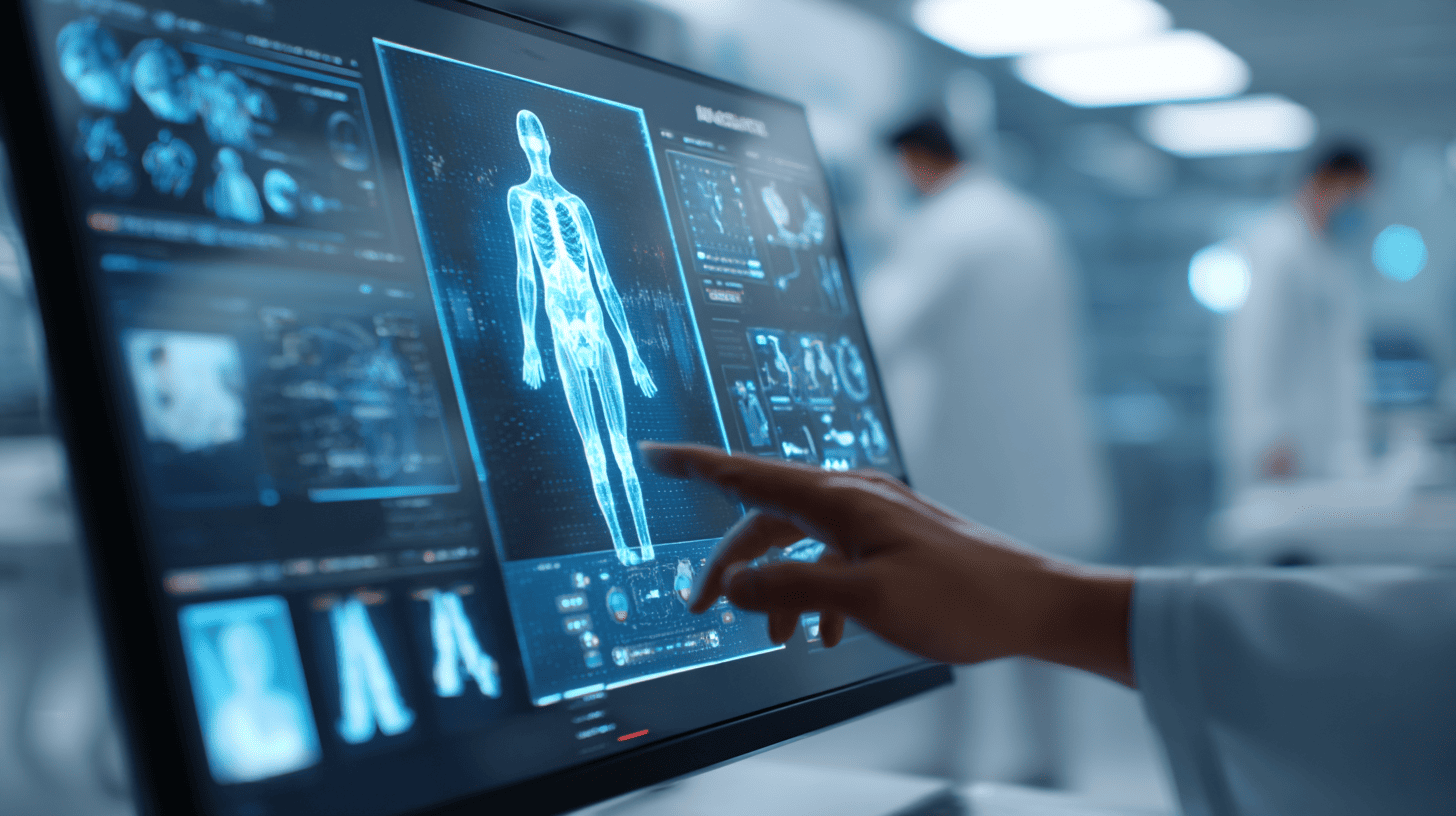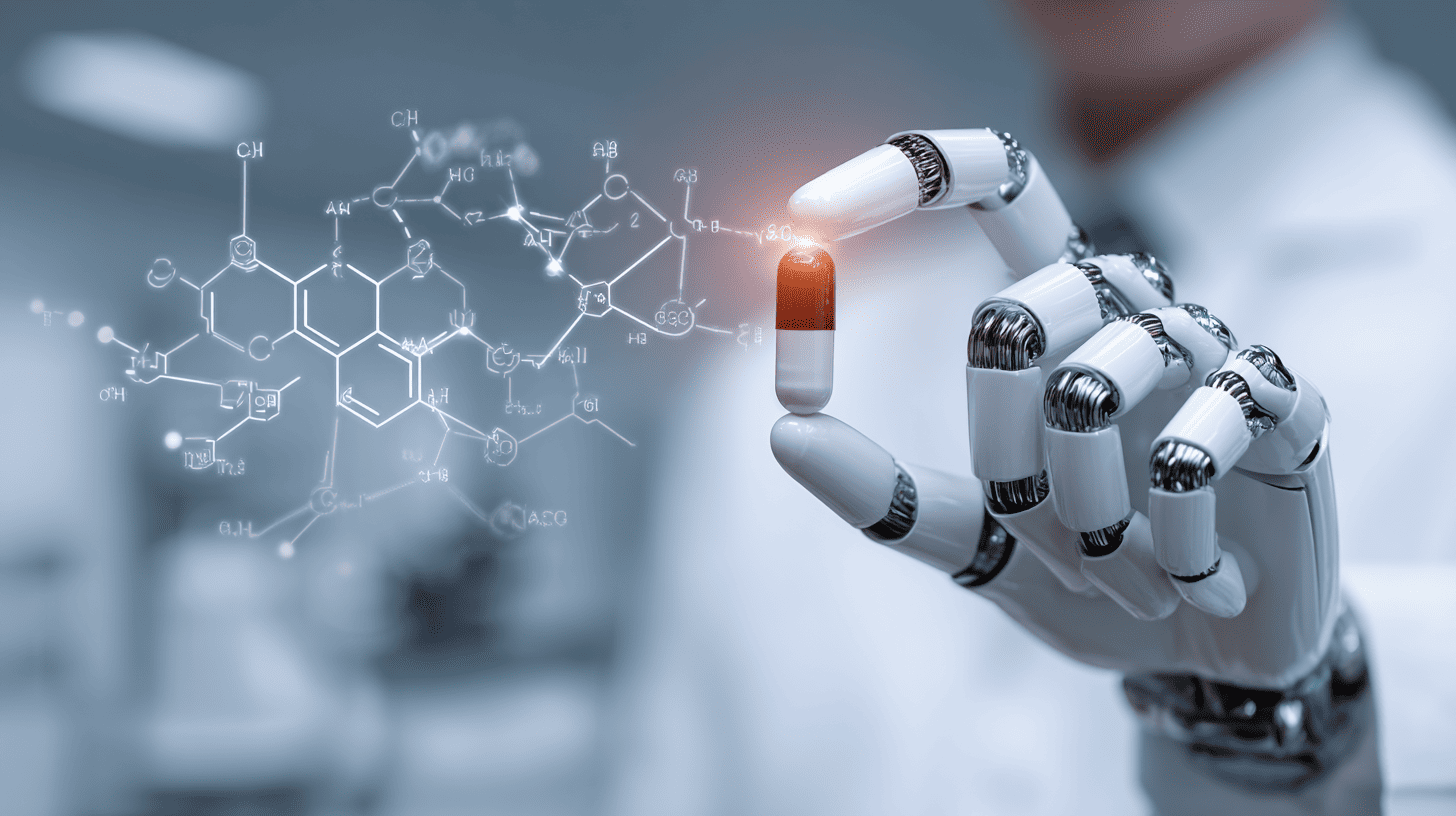The Role of AI in Healthcare: Simplifying Complex Processes
Alexander Stasiak
Oct 24, 2025・10 min read
Table of Content
AI in Diagnosing Illnesses
Tools for Early Detection
Improving Accuracy and Speed
Streamlining Treatment Plans
Personalised Patient Care
Reducing Human Error
Managing Patient Records
Enhancing Data Accessibility
Protecting Patient Privacy
AI in Drug Development
Speeding Up Research
Predicting Drug Efficacy
Future Prospects of AI in Healthcare
Addressing Ethical Concerns
Expanding Access to Care
See How AI Is Transforming Industries
Learn how intelligent tools simplify complex systems and empower businesses.👇
Healthcare systems juggle endless data and tasks every day, slowing down care when time matters most. AI in healthtech is stepping in to cut through the clutter and speed up those complex processes. You’ll see how smart tools are reshaping the way healthcare works behind the scenes—making it quicker, clearer, and more focused on patients.
AI in Diagnosing Illnesses

AI is changing how illnesses are detected and treated. It’s making things quicker and more accurate, which helps patients get the care they need faster.
Tools for Early Detection
Imagine catching an illness before it becomes a big problem. AI tools are helping doctors do that with more precision. With advanced imaging and data analysis, these tools can spot signs of diseases earlier than ever before. They look at patterns in scans and lab results, giving doctors a head start in treating patients.
Think about how many lives can be improved with early detection. About 70% of successful treatments begin with catching the illness early. These tools are like having an extra pair of eyes that never tire, always on the lookout for anything unusual. This means you get peace of mind, knowing that the technology is working hard in your favour.
Improving Accuracy and Speed
Accuracy is key in healthcare. AI helps by reducing the chances of human error. Machines can analyse thousands of data points in seconds without getting tired or distracted. This means quicker decisions—often cutting down diagnosis time by up to 50%.
Speed doesn't just help doctors; it benefits patients too. Faster results mean less waiting and worrying. You’ll know what’s happening with your health sooner, allowing you to take action without delay. The longer you wait, the less time you have to address potential issues. AI provides that crucial time-saving advantage.
Streamlining Treatment Plans
After diagnosing, the next step is planning the treatment. AI makes this process smoother and more personalised, focusing on what works best for each individual.
Personalised Patient Care
Your health needs are unique, and your treatment plan should reflect that. AI analyses data from various sources to find out what works best for you. This creates a plan that suits your specific situation, rather than a one-size-fits-all approach.
By looking at your medical history, lifestyle, and even genetic information, AI crafts a treatment plan tailored just for you. This ensures you get the most effective care possible. As a result, you're more likely to experience better outcomes and fewer unnecessary side effects.
Reducing Human Error
Mistakes in healthcare can have serious consequences. AI helps minimise these by double-checking data and recommendations. It works alongside doctors as a reliable assistant, ensuring no detail is overlooked.
About 30% of medical errors are due to human factors. By using AI, these errors can be significantly reduced. This means you can trust that your treatment plan is as accurate and effective as possible. The reassurance of knowing your care is in capable hands can ease the stress of any medical journey.
Managing Patient Records

Keeping patient records organised is crucial for effective healthcare. AI is taking on this task, making information more accessible and secure.
Enhancing Data Accessibility
Have you ever waited for hours just to get your medical records sorted? AI changes that by organising and retrieving information faster. When doctors have quick access to your full medical history, they can make informed decisions without delay.
With AI, your records are updated in real time, ensuring doctors always have the latest information at their fingertips. This not only improves the efficiency of your care but also enhances communication between different healthcare providers.
Protecting Patient Privacy
While making data accessible is important, keeping it safe is crucial too. AI plays a big role in securing your personal health information. Advanced algorithms guard against breaches, ensuring that your data remains private.
You might worry about who has access to your information. AI uses encryption and other security measures to protect your data from unauthorised access. You can rest assured that your privacy is respected while still benefiting from the latest healthcare technologies.
AI in Drug Development

AI is speeding up research and making drug development more predictive, ensuring you get better treatments faster.
Speeding Up Research
The process of developing new drugs can take years. AI accelerates this by analysing vast amounts of research data quickly. This means scientists can identify potential treatments faster, cutting down the time it takes to bring new drugs to market.
Quicker research means you could have access to life-saving treatments sooner. The development of vaccines, for instance, has become more efficient, helping to combat diseases more effectively. The faster we develop drugs, the better equipped we are to tackle health challenges.
Predicting Drug Efficacy
Knowing if a drug will work before testing it on patients is a game-changer. AI predicts how effective a drug might be by simulating its effects. This reduces the risk of side effects and increases the likelihood of success.
Over 80% of drugs fail during trials, but AI helps narrow down the most promising ones. This ensures that only the best candidates move forward, saving time, money, and lives. It’s like having a crystal ball that guides researchers in the right direction.
Future Prospects of AI in Healthcare
Looking ahead, AI holds immense potential to shape the future of healthcare, addressing ethical concerns and broadening access to care.
Addressing Ethical Concerns
With great power comes great responsibility. As AI takes on more roles in healthcare, ethical questions arise. It’s crucial to ensure that AI decisions are fair and unbiased. Transparency in how AI operates can build trust and improve acceptance.
Most people worry about technology replacing human jobs. But in reality, AI is here to assist, not replace. By understanding its role and limits, we can use AI to complement human abilities, ensuring ethical standards are upheld.
Expanding Access to Care
AI is making healthcare more accessible, especially in remote areas. By providing virtual consultations and automated diagnostics, people can receive care without needing to travel long distances.
Think about how many lives could be improved if healthcare was within reach for everyone. AI helps bridge the gap, ensuring that quality care is available no matter where you live. This is a step towards a future where everyone has equal access to the healthcare they deserve.
Digital Transformation Strategy for Siemens Finance
Cloud-based platform for Siemens Financial Services in Poland


You may also like...

Gen AI and AI Difference
AI and GenAI are often used as the same term, but they solve different problems. This guide explains the difference, shows real examples, and helps you choose the right approach for your projects.
Alexander Stasiak
Jan 09, 2026・12 min read

How Is AI Used in Entertainment
Artificial intelligence is transforming entertainment, from content creation and recommendations to gaming, marketing, and audience engagement. Today, AI shapes how media is produced, discovered, and experienced across platforms.
Alexander Stasiak
Jan 13, 2026・8 min read

AI in Self Storage: Enhancing Efficiency and Boosting Profits
Discover how AI is transforming the self storage industry through automation, predictive analytics, and dynamic pricing.
Alexander Stasiak
Nov 13, 2025・12 min read
Let’s build your next digital product — faster, safer, smarter.
Book a free consultationWork with a team trusted by top-tier companies.








